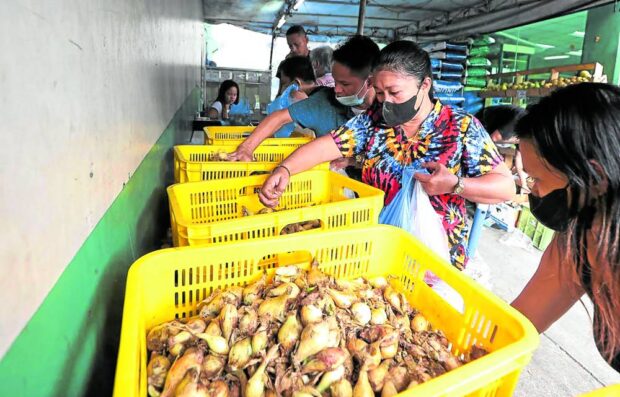
KEEPING IT LOW Kadiwa outlets, like this one selling onions at only P150 per kilo in this photo taken last January, draw their supply directly from farmers, doing away with middlemen.
—NIÑO JESUS ORBETA
The Department of Agriculture (DA) has fine-tuned its program that sells fresh agricultural products to consumers at affordable prices through the Kadiwa store chain nationwide, a pet project of the Marcos administration.
Under the revised guidelines of the Kadiwa Financial Grant Assistance Program, the amount to be given to an intended beneficiary remains capped at P5 million, but this will now be used to equip farmers and fisherfolk to become reliable and efficient food suppliers.
When the DA issued the memorandum circular on the Kadiwa program in 2021, the guidelines focused on ensuring the accessibility and availability of essential food commodities in areas with high consumer demand, particularly among economically depressed and low-income families.
The DA said that the Kadiwa program “has proven effective in directly bringing fresh and affordable products to consumers in urban and other demand centers.”
“However, challenges continued to arise during the operations of Kadiwa. Farmers and fisherfolk experienced limitations in their ability to supply the requirements of institutional buyers, efficiency to transport their agri products, capacity to market their produce, and efficiency of their preharvest, postharvest, and value-adding activities, among others,” it said.
The new rules will also seek to increase the number of participating farmers and fisherfolk cooperatives and associations (FCAs) and encourage partnerships between them and private sector buyers to ensure the sustainability of the agri-enterprise program.
The program is open to all eligible FCAs duly registered with relevant government agencies such as the Securities and Exchange Commission, the Cooperative Development Authority, and the Department of Labor and Employment’s Bureau of Rural Workers.
Individual farmers, sole proprietorship enterprises, and nonregistered groups are excluded from the program.
Qualified beneficiaries may use the financial grant for any or a combination of the following: trading or working capital of up to P1 million; purchase of machinery or equipment for preprocessing and processing or value-adding activities, and procurement of transport and delivery vehicles.
It may also be used to establish or rehabilitate storage facilities, warehouses, postharvest facilities, and processing centers; buy retail-selling equipment such as freezers, chillers, display racks and shelves, manual or digital weighing scales, and crates; create or renovate Kadiwa stores, and expand their agri-fishery enterprise.
All eligible proponents are required to provide equity equivalent to at least 20 percent of the total project cost, whether in cash or in kind.
LGUs are still allowed to become a conduit but the local government or its identified FCA beneficiaries must also provide the counterpart.
The proponent must also keep the Kadiwa store operating for at least five years after receiving financial aid.
Community-based organizations will still be tapped to operate and manage Kadiwa outlets in public markets and stand-alone Kadiwa stores.
The grant, however, will no longer be provided for nonfood commodities such as rubber, fiber and copra, and for production support such as the provision of seedlings, planting materials, fertilizers, farm machinery and equipment, and for relending.
Expanding network
The DA has been intensifying its Kadiwa operations within and outside Metro Manila in line with the country’s postpandemic transition.
President Marcos, who sits as concurrent agriculture secretary, has vowed to expand this initiative, introduced by his late father when he ruled in the 1970s, to address the steep prices of food products and provide a ready market for farmers and fishers.
The DA earlier reported that 931 farmers’ cooperatives and associations and agri-based enterprises have generated total sales of P2.38 billion through the Kadiwa project.
The objective of the program is to do away with middlemen, thus helping farmers and fishers get a higher price for their produce, and providing consumers in urban areas with agri-fishery products such as rice, fish, poultry, and livestock products, fruits and vegetables, and other basic commodities at affordable prices.
Small agricultural producers are also able to increase their income with the additional market created by the Kadiwa program.
For the economy, this helps keep inflation in check by ensuring the stability of prices and supply of food and other basic commodities.
At the launching of the project in Cebu last February, for example, vendors at the Kadiwa store were selling onions at P190 a kilo compared to the prevailing price then of P300 in local markets.
Consumers were also able to buy rice for as low as P25 a kilo as against the current retail price ranging from P34 to P60.
Since the program’s launching last year, there are now more than 500 Kadiwa stores nationwide.
READ: Kadiwa ni Ani at Kita program helped 41,357 farmers, says DA